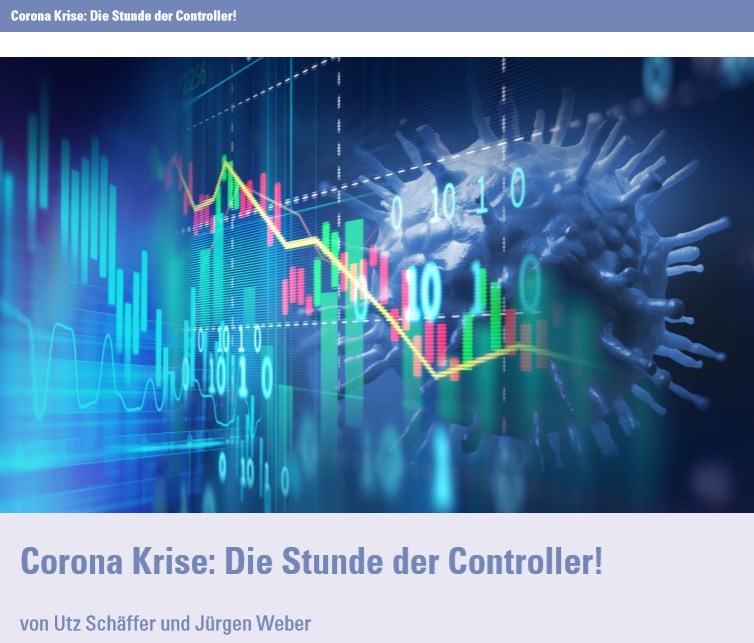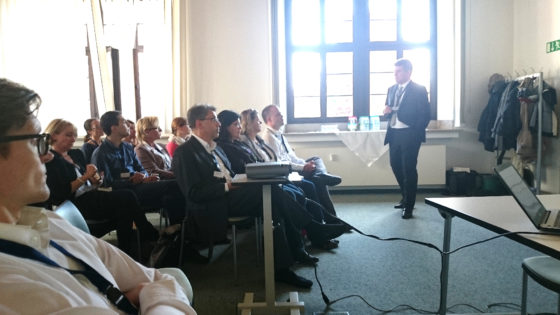Unter der Überschrift „Corona Krise: Die Stunde der Controller!“ haben Prof. Dr. Utz Schäffer, Direktor Institut für Management und Controlling (IMC) der WHU – Otto Beisheim School of Management, Campus Vallendar, Mitglied im ICV-Kuratorium, und Prof. Dr. Dr. h.c. Jürgen Weber, Direktor des Instituts für Management und Controlling (IMC) der WHU – Otto Beisheim School of Management, Campus Vallendar, Vorsitzender des ICV-Kuratoriums, einen aufrüttelnden Beitrag zur Rolle der Controller*innen in diesen dramatischen Zeiten verfasst. Dieser Beitrag erscheint in der kommenden Ausgabe des Controller Magazins (Mai/Juni 2020). Wir dürfen den Text hier vorab veröffentlichen (ungekürzter Text: Download PDF).
Schäffer und Weber gehen davon aus, dass in der Krise die zentralen Kompetenzen der Controller gefragt sind:
- Im Reporting die Auswirkungen der Krise auf Ergebnis und Cash zeitnah zu berichten und Implikationen – (besonders) kritische Entwicklungen – aufzuzeigen.
- Durch gutes Cash Management eine ausreichende Liquidität sicherzustellen.
- Auf der Basis einer intimen Kenntnis der Kostenstrukturen Einsparpotentiale zu erkennen und die Investitionen zu identifizieren, die am ehesten auf die lange Bank geschoben werden können.
- Nicht zuletzt: Den Fokus auf das Wesentliche sicherzustellen!
Bei allem aktuellen Handlungsdruck biete sich in dieser Krise doch die Gelegenheit, bestehende Instrumente zu stärken, so die Autoren. Z.B. sollte nicht mehr zugelassen werden, dass „diese nur als Alibi zur Bestätigung vorgefasster Meinungen verwendet werden – und neue Methoden einzuführen; ein systematisches Cash-Management mag genauso dazu zählen wie Simulationen. Mit all dem kann der Controller in der Krise ein wertvoller Ratgeber des Managements und nicht zuletzt zentraler Bestandteil eines Krisenreaktionsteams sein.“
In ihrem Text warnen die ICV-Kuratoren Schäffer und Weber zugleich vor evtl. Fehlern: „Wer in der aktuellen Situation weiter viel Zeit und Energie darauf verwendet, Ist-Zahlen mit dem längst obsoleten Forecast zu vergleichen, wird sich kaum als Business Partner in der Krise positionieren können. Im Krisengewitter gilt es im ersten Schritt, alte Planwerte und Forecasts schnell ad acta zu legen und mit möglichst aktuellen Istwerten auf Sicht zu steuern.“ Daneben würde es in der Regel auch Sinn machen, die Granularität von Bericht und Forecast in Frage zu stellen und ggf. radikal zu reduzieren.
Schließlich sprechen die beiden Professoren einen weiteren Punkt an, der ihnen sehr wichtig ist: Controller*innen sollten aktuell nicht nur auf die negativen Entwicklungen und Probleme schauen, sondern auch die Chancen in der Krise identifizieren und dafür Sorge tragen, dass Maßnahmen ergriffen werden, um diese auch zu nutzen.
Under the heading “Coronavirus crisis: controllers´ time to shine!” Prof. Dr. Utz Schäffer, Director of the Institute for Management and Controlling (IMC) at WHU – Otto Beisheim School of Management, Vallendar Campus, member of the ICV Board of Trustees, and Prof. Dr. Dr. h.c. Jürgen Weber, Director of the Institute for Management and Controlling (IMC) of WHU – Otto Beisheim School of Management, Campus Vallendar, Chairman of the ICV Board of Trustees, wrote a startling contribution to the role of controllers in these dramatic times. This article appears in the upcoming issue of Controller Magazin (May / June 2020). We can publish the English Version of text here in advance (Schäffer_Weber_CM_Controllers’ time to shine). The English version was firstly published in the ICV Bulletin for the ICV members.
Schäffer and Weber assume that the central controller’s competencies are required in the crisis:
- Reporting the effects of the crisis on profit and cash flow in a timely manner and showing implications – (particularly) critical trends.
- Ensuring sufficient liquidity through effective cash management.
- Recognizing potential savings on the basis of an in-depth knowledge of the cost structures and identifing the investments that can most easily be put on the back burner
- Last but not least: ensuring the focus on the essentials!
Despite all the current pressure to act, this crisis offers the opportunity to strengthen existing tools, according to the authors. For example it should not be allowed „to use them merely as alibis for preconceived ideas. It also provides a chance to introduce new methods, such as systematic cash management or simulations. In all these ways, the controller can be a valuable adviser to management during the crisis and – vitally – a key member of the crisis response team.”
In their text, the ICV Trustees Schäffer and Weber also warn of possible errors: “In a situation like the present, continuing to devote a lot of time and energy to comparing actual figures with outdated forecasts will make it difficult to step up to the plate as an effective business partner. When you hit the choppy waters of a crisis, the first thing to do is put aside old projections and forecasts and take each day as it comes, using the most up-todate data to steer the business.” In addition, it would usually make sense to question the granularity of the report and forecast and, if necessary, to radically reduce it.
Finally, the two professors address another point that is very important to them: controllers should not only look at the negative developments and problems at the moment, but also identify the opportunities in the crisis and ensure that measures are taken to use these too.




Neueste Kommentare